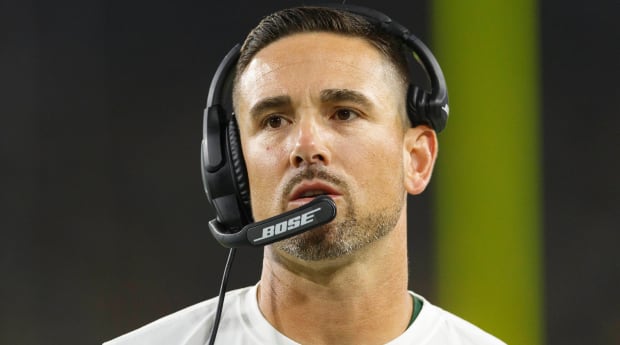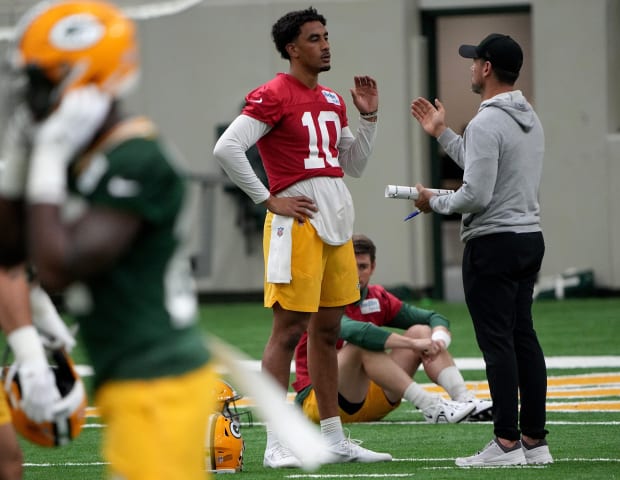Matt LaFleur knows what he wants, and it has nothing to do with a box score.
LaFleur, 43, is in his fifth year as coach of the Packers. The dominant story this offseason in Green Bay has been first-year starting quarterback Jordan Love, and rightfully so. But the underplayed story is LaFleur, who now faces a season of change and uncertainty.
On this tempered August day in Green Bay, Wis., I'm walking from the practice field to Lambeau Field’s cafeteria with LaFleur between two rows of adoring fans. One fan wants LaFleur to take a selfie with her. Another asks for him to sign her baby’s onesie.
LaFleur, dressed in all black and wearing a muted gray hat, is cordial but uncomfortable. He wants to find his refuge inside the facility across Oneida Street.

Jeff Hanisch/USA TODAY Sports
There, I ask LaFleur a simple question: What do you want your team’s identity to be?
“We know we play an imperfect game,” LaFleur says after Tuesday’s practice at Nitschke Field. “I want it to show through all the intangibles that take no talent. The effort at which we’re flying to the football defensively. How hard are we blocking for each other offensively? All of the things that at the end of it, it takes no talent to do. That doesn’t just create itself on gameday. That has to be through your practice habits and what you do each and every day. Are you going to the extreme, are you going to exhaust yourself in every situation, every opportunity that you go out there on the grass?”
The answer is simple yet telling.
This vision wasn’t adopted in Green Bay. It had been shaped for years. As an offensive assistant with five NFL teams across 10 seasons before being hired by the Packers, LaFleur was diligently crafting not only who he wanted to be, but also what his team should look like.
In that vein, LaFleur has established a culture in Green Bay, one that may transcend roster turnover even at the sport’s paramount position.
“He’s smart and organized,” says Seahawks offensive coordinator Shane Waldron, who coached with LaFleur as a Rams assistant in 2017. “He had a plan and a philosophy of what he was going to be as a head coach. It seems he’s really stuck to it, and the team has really taken to him as a head coach. Going back to playing against him in the [2019] playoff game, you see the toughness, the grittiness and the high level of execution from the players there.”
Still, last year’s Packers remain a bit of a mystery for LaFleur. After starting 3–1, Green Bay’s season began to spiral in the second half of its loss in London to the eventual playoff-bound Giants.
The defeat began a string of five consecutive losses, and seven over an eight-game stretch. When the Packers did pull themselves together, they were 4–8 and won four straight before losing to the Lions at Lambeau in a win-and-in Week 18 playoff scenario.
Looking back, LaFleur says Green Bay struggled to flip the momentum. What he did take out of it was a competitive spirit being rekindled down the stretch, beginning in the second half of a 27–17 loss to the Bills in Week 8 on Sunday Night Football.
While the season ended at 8–9, LaFleur believes this summer has been full of competition. It’s one of the reasons he’s high on his young group.
“It’s been awesome,” he says. “The guys have been energized. There’s a lot of competition. I’ve got to give it up to (general manager Brian Gutekunst) and his staff in terms of being able to load our roster. There are a lot of guys fighting for spots. It naturally brings out the best in everybody. There’s youth in certain positions. I like the veterans that are here. I think they’re trying to teach these guys what it takes to play at this level on a consistent basis. I’ve loved the attitude, the energy; I feel like our guys are competing out there. The thing we’ve really challenged our team with is what is it going to look like when we put the tape on?”
One of those veterans answering the challenge is Aaron Jones.
Jones, 28, is entering his seventh season with the Packers. For years, Jones has been a reliable force in LaFleur’s offense, totaling 1,000 yards three times over the past four seasons while combining for 111 receptions since 2021. With Love taking over under center, the running game will be more important than ever in LaFleur’s tenure.
And while LaFleur sees leadership from his older players, Jones sees a coach who is both familiar but also adaptable to the situation at hand.
“He’s bringing that same energy every day,” Jones says. “His attention to detail is a little more. We’ve got some younger guys. He’s really nailing the details, really getting down to the fine things and why we’re doing certain things, certain ways. … He’s gotten more and more comfortable around the team. I was here with him his first year, his first time standing in front of a team meeting. It’s night and day. I’m so proud of Coach, the way he’s continued to grow himself and this team. He’s not all about himself. He’s about this team. He listens to the players. He’s a special coach to play for. There’s not many out there like him.”
“What you see is what you get,” guard Royce Newman says. “He’s very detail-oriented. If you’re not playing to his standard, he’s going to try to get you there.”
Entering a new era, LaFleur is adamant that his style, philosophy, principles and core beliefs haven’t changed, and he has kept an open mind to schematic alterations.
Part of LaFleur’s offseason entailed studying other teams with young receiving corps, understanding how they were used and what led to their success.
LaFleur notes he enjoys going back to his roots, looking at tape of the 49ers, Rams and Dolphins, all led by coaches who shared a staff with LaFleur during his days as an assistant in Washington and Los Angeles.
“Mike [McDaniel] was a pretty good example of how they used Tua [Tagovailoa]. I thought he played really well last year. Kyle [Shanahan] did it with a guy who was Mr. Irrelevant [Brock Purdy]. A guy who wasn’t highly regarded. It’s cool to look at different ways of how they utilized their personnel and got their playmakers the ball.”
LaFleur went on to note Lions offensive coordinator Ben Johnson, who last year coaxed a 29-touchdown season out of veteran quarterback Jared Goff, a is former student of LaFleur’s during his 2017 season as the Rams’ offensive coordinator.
However, LaFleur’s vision for his own team was much harder to see.
Going into the draft, the Packers had one of the more barren offensive depth charts in football. While LaFleur knew he had a trio of notable, returning receivers in Christian Watson, Romeo Doubs and Samori Toure along with running backs Aaron Jones and AJ Dillon, there were major questions at tight end. Then there was the depth portion of the receiver room, all of which was addressed by Gutekunst in the draft.
During those three days in April, the Packers selected tight ends Luke Musgrave (second round, No. 42) and Tucker Kraft (third round, No. 78), and receivers Jayden Reed (second round, No. 50), Dontayvion Wicks (fifth round, No. 159) and Grant DuBose (seventh round, No. 256). Green Bay also signed undrafted free agent Malik Heath, a standout through training camp and the preseason, turning heads within the organization.
“There was a lot of trial and error over the course of OTAs and trying to piece everything together,” LaFleur says. “Shoot, we’ve made a lot of changes since then as you find out more information about your guys. Our job as coaches is to put these guys in the best position possible. There was a lot of not only studying yourself but studying other teams and trying to figure out how we can put our best product out on the field.”
Green Bay has one more preseason game coming Saturday at home against the Seahawks. After that, LaFleur will have 15 days to prepare for the Bears, the Packers’ Week 1 opponent. A loss to Chicago means alarm bells will begin flooding the Wisconsin airwaves.

Mark Hoffman/Milwaukee Journal Sentinel/USA TODAY NETWORK
Back on May 23, I was in Green Bay for the team’s second OTA practice. It was a rough afternoon for Love, who went 6-of-16 with three dropped interceptions. That day, LaFleur took the podium during his press conference and, in response to a question, stated the offense would be a work in progress all year.
Three months later, I asked LaFleur about that comment. In the time since, had his feelings changed on the group? Had the offense made an unexpected leap, or was it a unit likely to both struggle and succeed throughout the upcoming 18-week schedule?
LaFleur grinned before answering, saying even the best are a constant work in progress. Then he expounded, saying the offense was much further along than it was in the spring, specifically citing the quarterback room.
Rounding out his answer, LaFleur put the pressure on himself, stating it’s up to the coaching staff to put his players in the best position to succeed.
The story this offseason in Green Bay has been about Love, but Matt LaFleur is the man most responsible for the Packers’ fate, and Green Bay is in good hands because of it.







